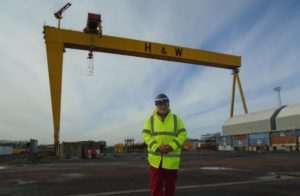This February, we are proud to introduce Phil McClean, one of our Welding and Steelwork Inspectors and ex Harland & Wolff Apprentice!
 An incredibly varied role, Phil oversees the construction of fabricated units alongside the coordination of all inspection activities for the client and DNV (the industrial classification society).
An incredibly varied role, Phil oversees the construction of fabricated units alongside the coordination of all inspection activities for the client and DNV (the industrial classification society).
On top of this, Phil also pursues continual audits within the build process and ensures consumable control whilst monitoring the welding parameters. He is responsible for the quality control inspections during constructions which includes the coordination of official surveys between the DNV and the Client.
Having been with us at Harland & Wolff for now over 45 years, we caught up with him to find out about his apprenticeship and life at Harland & Wolff.
It’s been over 45 years since you started your journey at Harland & Wolff, what first attracted you to a career and apprenticeship here?
I was introduced to the idea of a career at Harland & Wolff through my father who worked here. Being only 16 at the time, my father guided me into the world of shipbuilding! Shipbuilding is a tradition in the McClean family, with me being the third generation of McClean to work at Harland & Wolff.
After finishing my education in December 1973, it was my father who made the enquiries regarding apprenticeships.
Luckily, we were told that the next intake of apprentice applications was due to open the following January in 1974. With the help of my father, we quickly put together my application form and arranged my interview. Successful, I had secured my apprenticeship!
What do you enjoy most about working for Harland & Wolff?
Over the years at Harland & Wolff, the company has given me a tremendous amount of time for self-improvement. After completing my apprenticeship and with the further education opportunities within my trade, I have now been for several years, the company’s qualified Welding and Steelwork Inspector.
By attaining these specific qualifications, I have been able to represent the company throughout the UK, Europe and the Middle East on various co-engineering construction projects.
Tell me more about your apprenticeship!
It was the 7th of January 1974, and I was embarking on my new working venture – my first year felt like an extension of my school years!
All apprentices in their first year were sent to the purpose-built training centre within the premises of Harland & Wolff. All the instructors had been Harland & Wolff tradesmen all their working life and were strict in discipline. There, you were taught the physical attributes that would be required to be a good tradesman, in my case a good welder.
After my first year, it was time for me to be sent out into the production/construction areas. At the time Harland & Wolff were building oil tankers / bulk carriers and my first production weld was on a Super Tanker called Lotorium Ship No 1694.
Over the next three years, I was mentored by several tradesmen – at the time they were called ‘Journey Men’. They helped me along the Welding Supervisor path to complete confidently more elaborate welding joints.
During the four years of my apprenticeship, I was given what we called “day release”, this was the time you spent at Belfast Technical College (one day per week) to be taught the technical principles of Welding and in turn, if successful, you were given a City & Guilds technical qualification.
In 1976, I was recognised by Harland & Wolff as a successful competent apprentice, thus being awarded the “Samuel Baillie Trophy”. This trophy was given to the best post-first-year apprentice.
Once I completed my apprenticeship, I continued to take further education courses in welding. Held at Newtownabbey Technical College, through evening classes I was awarded more technical qualifications and in 1982 I was fortunate to get promotion into the Harland & Wolff Quality Department as a Welding /Steelwork Quality Inspector.
What did enjoy most about your apprenticeship?
During my apprenticeship at Harland & Wolff not only did I receive excellent guidance and training, but I met and worked with great mentors which helped me learn my trade. I also learnt invaluable life lessons which made me the person I am today, bringing honesty and integrity not only to the workplace but outside the yard.
Why should you become an apprentice at Harland & Wolff?
Harland & Wolff is rebuilding for the next generation of engineers and tradespeople.
You would be part of that next generation and with new engineering technology, we want you to be part of our world-renowned company.
What advice can you give to any incoming apprentices?
During your apprenticeship and beyond, it will be a continuous learning process. Harland & Wolff will be investing in you and will teach you and give you excellent opportunities to excel and maximise your capabilities.
Grasp every opportunity to learn the skills required in the field you choose. You will be an employee of one most iconic companies in the world you will also be involved in the company’s future successes, be proud, be very proud.
Want to be part of one of the biggest names in shipbuilding? Unlock your future now and register your interest in our apprenticeship scheme here

